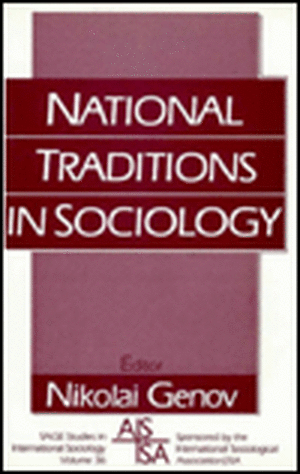National Traditions in Sociology: SAGE Studies in International Sociology, cartea 36
Editat de Nikolai B. Genoven Limba Engleză Hardback – 5 iul 1989
Din seria SAGE Studies in International Sociology
-
 Preț: 107.18 lei
Preț: 107.18 lei -
 Preț: 104.13 lei
Preț: 104.13 lei -
 Preț: 379.40 lei
Preț: 379.40 lei -
 Preț: 134.42 lei
Preț: 134.42 lei - 15%
 Preț: 439.94 lei
Preț: 439.94 lei -
 Preț: 359.35 lei
Preț: 359.35 lei - 15%
 Preț: 429.11 lei
Preț: 429.11 lei -
 Preț: 434.31 lei
Preț: 434.31 lei - 15%
 Preț: 436.89 lei
Preț: 436.89 lei -
 Preț: 141.58 lei
Preț: 141.58 lei - 18%
 Preț: 1002.18 lei
Preț: 1002.18 lei - 15%
 Preț: 421.20 lei
Preț: 421.20 lei - 15%
 Preț: 467.99 lei
Preț: 467.99 lei -
 Preț: 441.33 lei
Preț: 441.33 lei - 18%
 Preț: 1156.54 lei
Preț: 1156.54 lei - 18%
 Preț: 999.64 lei
Preț: 999.64 lei -
 Preț: 445.56 lei
Preț: 445.56 lei - 15%
 Preț: 429.11 lei
Preț: 429.11 lei -
 Preț: 168.69 lei
Preț: 168.69 lei -
 Preț: 153.12 lei
Preț: 153.12 lei -
 Preț: 144.85 lei
Preț: 144.85 lei - 18%
 Preț: 1195.55 lei
Preț: 1195.55 lei - 23%
 Preț: 1224.41 lei
Preț: 1224.41 lei - 18%
 Preț: 989.72 lei
Preț: 989.72 lei -
 Preț: 134.83 lei
Preț: 134.83 lei - 15%
 Preț: 432.08 lei
Preț: 432.08 lei - 15%
 Preț: 429.62 lei
Preț: 429.62 lei -
 Preț: 272.01 lei
Preț: 272.01 lei -
 Preț: 272.01 lei
Preț: 272.01 lei
Preț: 1054.75 lei
Preț vechi: 1286.28 lei
-18% Nou
Puncte Express: 1582
Preț estimativ în valută:
201.83€ • 219.92$ • 170.07£
201.83€ • 219.92$ • 170.07£
Carte tipărită la comandă
Livrare economică 23 aprilie-07 mai
Preluare comenzi: 021 569.72.76
Specificații
ISBN-13: 9780803981973
ISBN-10: 080398197X
Pagini: 256
Dimensiuni: 138 x 216 x 19 mm
Greutate: 0.45 kg
Ediția:1
Editura: SAGE Publications
Colecția Sage Publications Ltd
Seria SAGE Studies in International Sociology
Locul publicării:London, United Kingdom
ISBN-10: 080398197X
Pagini: 256
Dimensiuni: 138 x 216 x 19 mm
Greutate: 0.45 kg
Ediția:1
Editura: SAGE Publications
Colecția Sage Publications Ltd
Seria SAGE Studies in International Sociology
Locul publicării:London, United Kingdom
Recenzii
`these essays, well written and carefully documented are both interesting and intriguing.... Offers a a marvelous opportunity to discover how one's colleagues in other countries approach sociology.' - Choice`Each essay in the book exposes the reader to the specific flavour of sociology practised in one or another state society, what the book achieves as a whole goes far beyond the intents of particular pieces. First, the book unfolds that sociology as a discipline shares a set of concepts, theories and methodologies irrespective of the character of the locale in which it is practised. Second, the book helps one, to identify the pre-requisities which fosters sociology as a creative discipline - cultural pluralism, political freedom and committment to analyze the problems of one's society' - Sociological Bulletin
Cuprins
National Sociological Traditions and Internationalization of Sociology - Nikolai Genov
Australian Sociology and Its Historical Environment - Diane Austin-Broos
Canadian Sociology on the World Scene - David Millett
The Development of Sociology in Columbia - Gonzalo Catano and Gabriel Restrepo
The Development of Sociology in France after 1945 - Alain Drouard
Sociology in the German Democratic Republic - Rudi Weidig
Sociology in the Federal Republic of Germany - Johannes Weiss
Tradition, Modernization, and Sociology (The Case of Hungary) - Kalman Kulcsar
Indian Sociology or Sociology in India? - Ramkrishna Mukherjee
Building National Sociological Tradition in an African Subregion - Akinsola Akiwowo
Traditions and Specific Features of Sociology in the USSR - Vilen Ivanov and Gennadi Osipov
Sociology in Britain after World War II - Martin Albrow
American Sociology - Jonathan H Turner
Its Growth and Contemporary Profile
Australian Sociology and Its Historical Environment - Diane Austin-Broos
Canadian Sociology on the World Scene - David Millett
The Development of Sociology in Columbia - Gonzalo Catano and Gabriel Restrepo
The Development of Sociology in France after 1945 - Alain Drouard
Sociology in the German Democratic Republic - Rudi Weidig
Sociology in the Federal Republic of Germany - Johannes Weiss
Tradition, Modernization, and Sociology (The Case of Hungary) - Kalman Kulcsar
Indian Sociology or Sociology in India? - Ramkrishna Mukherjee
Building National Sociological Tradition in an African Subregion - Akinsola Akiwowo
Traditions and Specific Features of Sociology in the USSR - Vilen Ivanov and Gennadi Osipov
Sociology in Britain after World War II - Martin Albrow
American Sociology - Jonathan H Turner
Its Growth and Contemporary Profile
Descriere
The history of sociology -- outside of accounts of the thought and influence of such founding figures as Marx, Durkheim and Weber -- remains relatively little examined. With an increasing emphasis on the globalization of research and knowledge, there is a growing need for scholars to understand the context of disciplinary development in other countries.
In this book an international team of authors consider the nature of sociology and its development in a range of countries. Concentrating on the period since 1945, they show how the intellectual and institutional history of sociology has varied widely. Key differences in the nature of sociology -- the stress on quantitative methods in American sociology, the growing influenc












